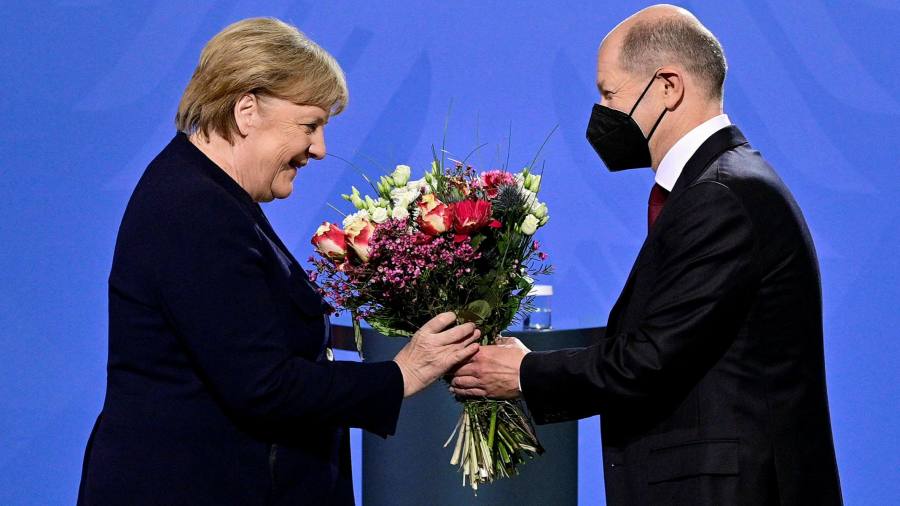As a French-born and -educated citizen, I am to appreciate and never question the top-down, centralised nature of the Fifth Republic, the presidential regime shaped by the late Charles de Gaulle in 1958. Every five years, I am required to elect a president with super executive powers, and give little thought to government and parliament. This is the price for stability and efficiency, or so we are taught. But I must confess that in the past two weeks I have experienced a sacrilegious feeling of envy at Germany’s grown-up coalition politics.
The French have been mesmerised by the understated exit of Angela Merkel, Germany’s centre-right chancellor for 16 years, and the arrival in power of the centre-left veteran politician Olaf Scholz. Commentary has underlined an austere yet benevolent democratic transition. As the French presidential campaign heats up and turns toxic, Berlin has offered a more consensual alternative to our confrontational political culture. “It’s what democracy should be, appeased . . . a mixture of change and continuity,” political scientist Dominique Moïsi marvelled on BFMTV. “Are we going to be capable of such a transition in April?” he wondered, referring to the presidential polls.
Merkel’s generous farewell speech to her successor, the bouquet of flowers Scholz gave her and the standing ovation she received in the Bundestag were worlds apart from the republican pomp the French are used to. For us, accustomed to the uncompromising nature of partisan politics, the marriage in Berlin of three parties with vastly different platforms — the liberal FDP, the leftwing Greens and the centre-left SPD — has been a source of wonder.
France’s electoral system is designed to create a parliamentary majority behind the president (this was reinforced by the reform in 2000 that aligned the presidential and legislative terms). Consensus is not the result of patient discussions between political parties, but is created by default, through a run-off between two presidential finalists. In 2017, Macron was elected against the far-right Marine Le Pen, even though he had won only 24 per cent of votes in the first round. So far this has kept the extremists at bay.
The cost is a “deep democratic malaise” in France that Macron, who had pledged to “renew” politics, has not cured, political scientist Luc Rouban notes. The Macron presidency is one of the most technocratic and centralised in postwar France. By contrast, “the German transition projects the image of a well-functioning democracy,” Rouban says. In a comparative survey released in October, he and his colleague Bruno Cautrès found more profound mistrust of political parties than in Germany (and in the UK) — a trend that burst into the open with the gilets jaunes protests in 2018 and did not materially shift during the pandemic. “Political criticism is more virulent than in Germany or the UK, and it is concentrated on the president,” Rouban says.
This French mal–être (malaise) results in contradictory demands. A growing minority, 42 per cent, agree that “in democracy, nothing progresses, we need less democracy but more efficiency”. But separately, there is a desire for shifting more power to local entities and for more direct citizen consultations, according to Rouban.
France seems to be at an impasse. But would a return to a German-style parliamentary regime help? Only leftwing firebrand Jean-Luc Mélenchon believes so. He wants to curtail presidential powers and bolster those of parliament. But this is a minority view. Rouban thinks it would simply not work: surveys show that in France, political faultlines between left and right run deeper than in Germany, he says. History cannot be erased: memories of the messy postwar parliamentary republic that preceded the current constitution loom large.
“Compromise is tantamount to treason for French voters,” Rouban says. Friendly deals among parties are perceived as political shenanigans. Take a look at the French left, he says, fragmented and with little prospects of making it to the second round, yet still unable to unite. The French can dream about the German democratic model all they want — it will remain pure fantasy.



































